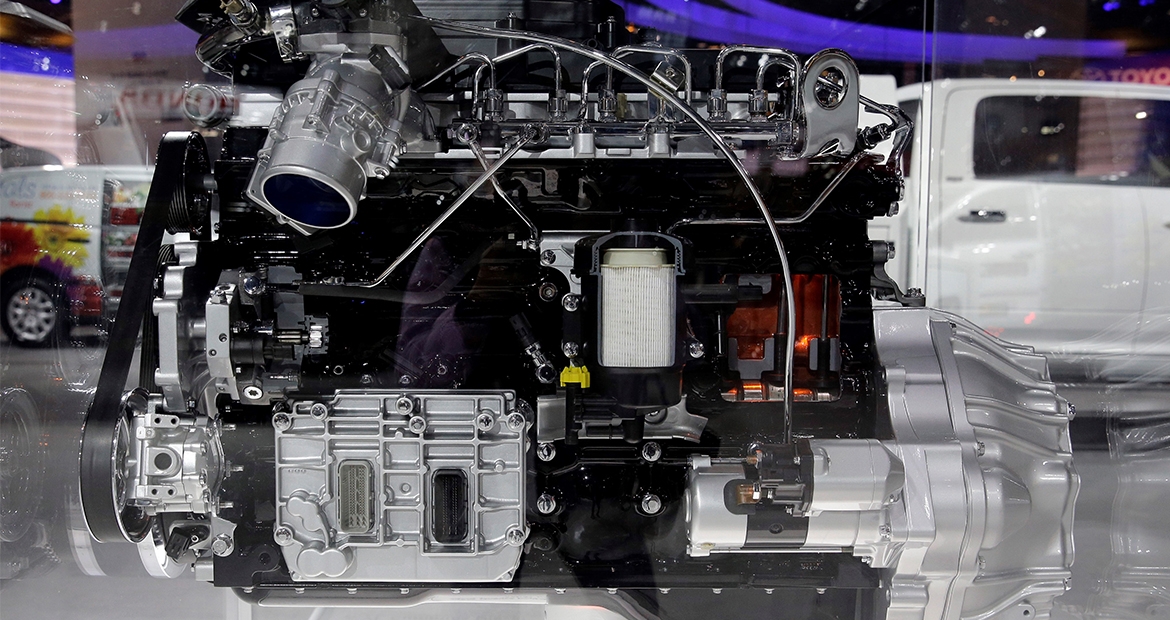How will Electronic Control Units (ECUs) evolve through the energy transition?
By Cummins Components Business Unit

The commercial transportation industry is undergoing a significant transformation, driven by the global push to reduce emissions. In parallel, our customers and fleet operators are trying to achieve more sustainable operations through improved fuel economy and efficient performance. As fuel technologies evolve, it is crucial to understand how Electronic Control Units (ECUs) will evolve to support these alternative fuel technologies.
This article explores the role of ECUs in different vehicle types, the challenges and considerations in their evolution and how Cummins Inc. is approaching these exciting technological advancements to benefit our partners and customers.
Click on the 'blue' spots on this interactive and find out more about ECUs.
What are Electronic Control Units (ECUs)?
Electronic control Units (ECUs) play a significant role in enhancing performance, lowering emissions, driving fuel economy, ensuring safety and maintaining the vehicle. As commercial transportation is working on achieving greener and cleaner operations, it is crucial to understand how control units will advance to meet evolving requirements.
ECUs can be of different types. Electronic control modules (ECMs) are a type of ECU that ensures the smooth operation of the engine by monitoring and collecting data from sensors positioned throughout the engine and vehicle. This data flow allows the ECM to not only optimize engine performance but also adjust critical parameters like fuel consumption and ignition timing, thereby playing a pivotal role in enhancing engine efficiency while reducing fuel usage.
The Powertrain control module (PCM) is another type of ECU. The PCM operates by constantly monitoring various parameters related to the engine, transmission, and other powertrain components through sensors placed strategically throughout the vehicle. In commercial vehicles, the PCM plays a critical role in maximizing efficiency, reliability and safety while minimizing emissions and maintenance costs throughout the vehicle's service life.
What is the Role of ECUs?
ECUs play a significant role in diagnostics. ECUs run software that continuously check behavior of sensors and actuators to look for anomalies. When anomalies are found, the diagnostic software records fault codes and help the service shops and technicians identify and fix problems more quickly and efficiently. ECUs serve as the engine's X-ray and CT-Scan and ensure optimal performance and reliability of engines, keeping vehicles operational for extended periods while reducing emissions.
For example, the ECM in modern engines monitors and analyzes data from sensors across the engine and vehicle. This data enables the ECM to optimize engine performance and adjust key parameters such as fuel consumption and ignition timing, which improves engine efficiency and reduces fuel consumption. Think about when you try to start your engine in cold weather. The ECM helps in controlling the timing of turning on certain components to ensure lower emissions.
The functions of the ECUs within a vehicle depend on different fuel systems and engine types.
In diesel and hydrogen internal combustion engines (ICE): ECUs power and sequence the injectors, spraying fuel into the combustion chambers. This includes controlling air-flow through turbo controllers as well as exhaust gas recirculation. They also manage after-treatment processes for exhaust cleaning. Cummins, for example, has been developing advanced control modules for these engines, ensuring high fuel economy and lower emissions.
In natural gas engines: While natural gas is cleaner and does not require extensive after-treatment, the ECMs in these systems still manage fuel injection and spark ignition systems. In various applications the ECUs control the valve timing to allow earlier ignition or delayed ignition which changes the power and torque output of the engine from each ignition cycle.
In battery electric vehicles (BEVs): The ECUs in BEVs differ significantly from those in diesel, hydrogen and natural gas engines. They handle multiple power conversion functions like onboard chargers that convert AC to DC power that help charge batteries. They also manage high-voltage batteries to power conventional vehicle electronics. The ECUs look out for electrical faults that could be potentially risky to the drivers and to the charging infrastructure.
Considerations for Developing ECUs For The Energy Transition
As we build towards a more sustainable transportation industry, developing cost-effective and precise electronics architecture that cater to different fuel systems and also to the regional market requirements, will be a challenge. This requires strong engineering talent, customer-focused teams with diverse expertise and continued R&D investment in technology development. The shift to next-generation control units for evolving environmental regulations, like the Euro 7 and EPA 2027 standards, is also going to require more investment, time and resources.
Cummins is well-positioned to address these challenges with its expertise cutting across technologies. By introducing its EC-AGS+ wireless control system for generator sets, which allows users to control their generator via an app on a mobile device, Cummins is leading the way to sustainability with advanced control units for a range of alternative fuel engines and generators.
As we move towards a more sustainable future, the role of control technologies becomes ever more important. This transition represents a critical step towards a greener, more efficient and technologically advanced vehicle landscape.
Author Profiles
Temas relacionados
Related Tags